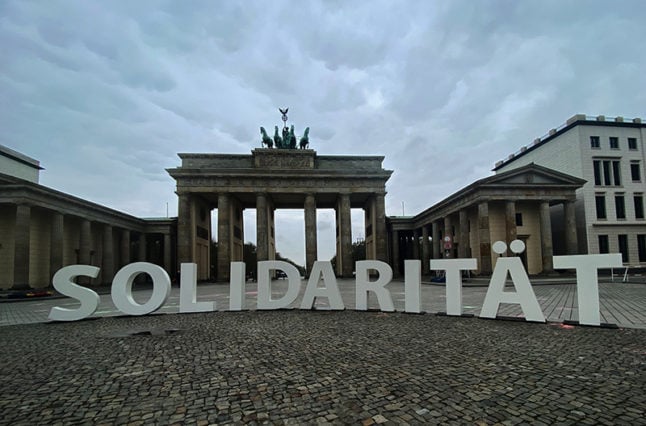Amid fears that the May 1st demonstrations planned by left- and right-wing groups could turn violent, 5,600 police officers from nine federal states were deployed to the capital.
Over 20 rallies were scheduled to be held over issues ranging from rising rents to Germany’s immigration policy and opposition to coronavirus curbs.

The DGB trade union confederation held its traditional rally at Berlin’s Brandenburg Gate on Saturday morning, marking the start of several May Day events and demonstrations.
The event was much smaller than in previous years due to the pandemic.
The anti-capitalist ‘MyGruni” demonstration in another part of the city took the form of a bicycle convoy through the Grunewald area and attracted around 10,000 participants, four times the number expected, Berlin news site RBB reported.
Despite the higher-than-expected turnout, a police spokeswoman said the event was trouble-free, according to RBB.
Police were under greater pressure this year as protests against the Covid-19 pandemic restrictions, many from the far-right, were also scheduled to take place alongside the usual left-wing rallies.

However, a demonstration held by critics of Covid-19 measures — the so-called ‘Querdenker’ group — was also quieter than anticipated with around 350 participants compared with the 1,000 expected.
READ ALSO: Germany’s spy agency to monitor ‘Querdenker’ Covid sceptics
Police said the protest was peaceful overall and German daily Bild reported that no “clearly recognisable” far-right extremists were present.
One protester was reported to have held a banner which read: “This is not a platform for AfD, Pegida, Nazis”.
However, not everyone was wearing face coverings, which are required. At the start of the demonstration, police took more than a dozen unmasked protesters aside to take down their details and issue administrative offence notices.
Police can be seen removing protesters in the below screenshot, one of several clips posted on Twitter.

A few metres away, around a hundred people took part in an opposing event against the Covid-19 critics, but the police quickly put themselves in between the two groups, the Berliner Morgenpost reported.
In the middle of the afternoon, the Berlin police said in a tweet that demonstrations had so far been mostly trouble-free. They said they had issued 59 notices, mainly for Covid-19 breaches.

However, there were still concerns that some of the evening’s protests, including the left and far-left groups’ traditional ‘Revolutionary May 1st Protest’, could turn violent, especially later in the evening, as they have in the past.
Authorities were expecting up to 10,000 protesters at the left-wing Revolutionary May Day march, which was scheduled to start at 6pm.
Unlike last year’s May Day when the number of people who were allowed to gather was restricted, the number of participants is not limited this year. However, people are still required to comply with social distancing and face covering rules.
Berlin Police Chief Barbara Slowik has said that her officers would “act consistently” and that any breaches of Coronavirus regulations would result in demonstrations being quickly broken up, RBB reported earlier.
Police officers would even use water cannons if necessary, she said.
State prosecutors were also on standby to sign arrest warrants if required, according to a spokeswoman from the prosecution service, Bild reported.
Elsewhere in Germany, there were clashes at an anti-fascist demonstration in Munich organised by the Revolutionary May 1st initiative, with police having to use pepper spray to break up demonstrators.
This was the second day of violence in the southern city after an anti-fascist protest on Friday also had to be dispersed.
According to Bild, participants didn’t observe social distancing and pushed against the police, prompting officers to use pepper spray.
Meanwhile, in Leipzig, three demonstrations were banned due to pandemic restriction measures, including a rally by the small right-wing Third Path party. A total of twelve demonstrations and bicycle convoys were registered.

Third Path demonstrations were also banned in the eastern cities of Zwickau and Plauen.



 Please whitelist us to continue reading.
Please whitelist us to continue reading.
Member comments